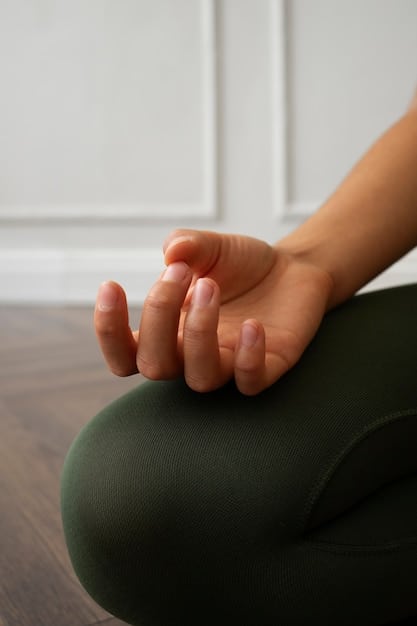Mindfulness Meditation: 5-Minute Practice for Enhanced Focus

Mindfulness meditation is a powerful technique to sharpen focus and reduce distractions, and this article provides a 5-minute daily practice, accessible to beginners, that can significantly improve concentration and mental clarity over time.
In today’s fast-paced world, maintaining focus can feel like a Herculean task. Distractions abound, and our attention is constantly pulled in different directions. But what if there was a simple, accessible technique that could significantly improve your concentration? Enter **mindfulness meditation for focus: a 5-minute daily practice for increased concentration** that can transform your ability to stay present and engaged.
What is Mindfulness Meditation?
Mindfulness meditation is the practice of focusing your attention on the present moment without judgment. It involves observing your thoughts, feelings, and sensations as they arise, without getting carried away by them. This simple yet profound practice can have a transformative impact on your ability to concentrate and stay focused.
But how exactly does this work? By regularly training your mind to return to the present moment, you strengthen your ability to disengage from distractions and maintain focus on the task at hand. Think of it as mental exercise for your attention span.

The Science Behind Mindfulness and Focus
Numerous studies have demonstrated the benefits of mindfulness meditation for improving focus and attention. Research has shown that mindfulness practice can increase gray matter in brain regions associated with attention regulation and focus. It also helps reduce activity in the default mode network, the part of the brain responsible for mind-wandering.
- Improved attention span: Regular mindfulness practice can help you stay focused for longer periods.
- Reduced mind-wandering: Mindfulness helps quiet the mental chatter and reduce distractions.
- Increased cognitive flexibility: Mindfulness can improve your ability to switch between tasks and adapt to changing circumstances.
By understanding the science behind mindfulness meditation, you can appreciate its potential to unlock your cognitive potential and enhance your ability to focus in all areas of your life.
Setting the Stage for Your 5-Minute Practice
Before diving into your 5-minute mindfulness meditation practice, it’s important to create a conducive environment that promotes relaxation and focus. This involves finding a quiet space, minimizing distractions, and adopting a comfortable posture.
Creating the right setting sets the stage for a more effective and enjoyable meditation experience. By minimizing external disturbances and adopting a comfortable posture, you can allow yourself to fully immerse in the present moment and experience the transformative benefits of mindfulness.
Finding a Quiet Space
Choose a location where you can sit undisturbed for 5 minutes. This could be a quiet corner of your home, your office, or even a park bench. The key is to find a space where you feel safe and relaxed. Also consider using a eye mask or ear plugs to limit distractions from external sources.
Your Posture Matters
Sit comfortably in a chair or on a cushion, with your back straight but not stiff. Your hands can rest gently in your lap or on your knees. Close your eyes gently or lower your gaze.
- Avoid slouching: Maintaining a straight back helps keep you alert and focused.
- Relax your shoulders: Release any tension in your shoulders and neck.
- Find your balance: Experiment with different postures until you find one that feels comfortable and sustainable.
With the stage set, you’re now ready to embark on your 5-minute mindfulness meditation practice. Remember, the goal is not to achieve a state of perfect stillness, but to cultivate awareness and acceptance of the present moment.
The 5-Minute Mindfulness Meditation Practice
This simple guide provides a step-by-step approach to practicing mindfulness meditation in just 5 minutes. This practice can easily be incorporated into a daily work routine.
By following these steps, you can cultivate a daily mindfulness meditation practice that will gradually enhance your focus, reduce stress, and improve your overall well-being. Consistency is key, so aim to practice every day, even if it’s just for a few minutes.

Step 1: Bring Your Awareness to Your Breath
Take a few deep breaths, noticing the sensation of the air entering and leaving your body. Gently shift your focus to your natural breath, without trying to control it. Pay attention to the rise and fall of your abdomen or the sensation of air passing through your nostrils.
Step 2: Observe Your Thoughts and Feelings
As you focus on your breath, you will inevitably notice thoughts and feelings arising in your mind. Acknowledge them without judgment, simply observing them as if they were clouds passing by in the sky. Don’t try to suppress or analyze them; just let them come and go.
- Label your thoughts: Mentally note what type of thought you’re having (e.g., “planning,” “remembering,” “worrying”).
- Acknowledge your emotions: Recognize any emotions that arise (e.g., “happiness,” “sadness,” “anger”) without getting carried away by them.
- Return to your breath: Whenever you notice your mind wandering, gently guide your attention back to your breath.
With each passing moment, you’ll gain more familiarization recognizing moments of distraction and calmly returning to focus.
Dealing with Distractions During Meditation
Distractions are common during meditation, especially when you’re first starting. It’s important to approach distractions with patience and non-judgment, recognizing that they are a natural part of the process. Mindfulness meditation is a learning process that becomes easier over time.
By learning to effectively deal with distractions, you can deepen your meditation practice and cultivate greater focus and awareness in your daily life. Remember, it’s not about eliminating distractions altogether, but about changing your relationship to them.
Acknowledge and Accept
When you notice your mind wandering, gently acknowledge the distraction without getting frustrated or critical of yourself. Simply recognize that your attention has drifted and gently guide it back to your breath.
Use a Mantra or Affirmation
Repeating a simple mantra or affirmation can help anchor your attention and reduce the impact of distractions. Choose a phrase that resonates with you, such as “I am present,” “I am calm,” or “I am focused,” and repeat it silently to yourself whenever you feel your mind wandering.
- Experiment with different mantras: Find a phrase that feels meaningful and supportive to you.
- Use repetition to deepen your focus: Repeatedly reciting your mantra can help quiet the mental chatter and center your attention.
Mindfulness is a discipline of retraining the brain, so always be supportive and patient during the learning process.
Benefits Beyond Focus: The Ripple Effect of Mindfulness
The benefits of mindfulness meditation extend far beyond improved focus. Regular practice can lead to increased self-awareness, reduced stress, enhanced emotional regulation, and improved overall well-being. A positive change in one area can have unexpected benefits in other areas of your life.
By embracing mindfulness as a way of life, you can unlock a world of potential and cultivate a greater sense of peace, focus, and fulfillment. You are not alone in finding new, positive habits in life.
Stress Reduction
Mindfulness meditation has been shown to reduce levels of cortisol, the stress hormone, and promote relaxation. By cultivating awareness of the present moment, you can learn to detach from stressful thoughts and emotions.
Improved Emotional Regulation
Mindfulness can help you become more aware of your emotions and develop the ability to respond to them in a healthy way. By observing your emotions without judgment, you can prevent them from overwhelming you and making impulsive decisions.
- Increase self-awareness: Mindfulness helps you become more attuned to your thoughts, feelings, and sensations.
- Develop compassion: Mindfulness can cultivate a sense of kindness and understanding towards yourself and others.
Consider finding a local support group to share similar experiences and help normalize the journey of mindfulness.
Integrating Mindfulness into Your Daily Routine
To maximize the benefits of mindfulness meditation, it’s important to integrate it into your daily routine. This could involve practicing meditation at the same time each day, incorporating mindfulness into everyday activities, or setting reminders to check in with yourself throughout the day.
By making mindfulness a regular habit, you can create a ripple effect that transforms your life for the better. With consistent practice, you’ll find that mindfulness becomes an effortless and natural part of your daily routine.
Mindful Moments Throughout the Day
Look for opportunities to practice mindfulness throughout the day, even when you’re not formally meditating. This could involve paying attention to the sensations of eating, walking, or washing dishes.
Set Reminders for Self-Check-Ins
Use your phone or computer to set reminders to check in with yourself throughout the day. Ask yourself how you’re feeling, what you’re thinking, and what you’re experiencing in the present moment.
- Start small: Begin by setting one or two reminders each day and gradually increase the frequency as you become more comfortable.
- Be patient: It takes time to develop a regular mindfulness practice, so don’t get discouraged if you miss a reminder or forget to check in with yourself.
| Key Point | Brief Description |
|---|---|
| 🧘 Daily Practice | A 5-minute mindfulness routine can be integrated into your day to boost focus. |
| 🧠 Focus Benefits | Improves attention span, reduces mind-wandering, and enhances cognitive abilities. |
| 🧘 Setting the Stage | Finding a quiet space and adopting a comfortable posture are crucial for meditation. |
| ✨ Dealing with Distractions | Acknowledge distractions without judgment and gently guide attention back to breath. |
Frequently Asked Questions
▼
Even a few minutes of daily practice can lead to noticeable improvements in focus and well-being over time. Consistency is key, so aim to practice every day, even if it’s just for 5 minutes.
▼
One common misconception is that you need to clear your mind completely. In reality, the goal is not to eliminate thoughts, but to observe them without judgment and gently guide your attention back to the present moment.
▼
Yes, mindfulness meditation has been shown to reduce levels of cortisol, the stress hormone, and promote relaxation. It can also help you develop healthier coping mechanisms for dealing with stress and anxiety.
▼
Mindfulness meditation is generally safe and beneficial for most people. However, if you have a history of mental illness, it’s important to talk to a healthcare professional before starting a practice.
▼
It’s normal to experience difficulty focusing during meditation, especially when you’re first starting. Be patient with yourself and gently guide your attention back to your breath whenever you notice your mind wandering.
Conclusion
Incorporating a 5-minute mindfulness meditation practice into your daily routine can be a powerful tool for enhancing focus and improving your overall well-being. By learning to cultivate awareness of the present moment, you can reduce distractions, manage stress, and unlock your cognitive potential. Start today and experience the transformative benefits of mindfulness.





